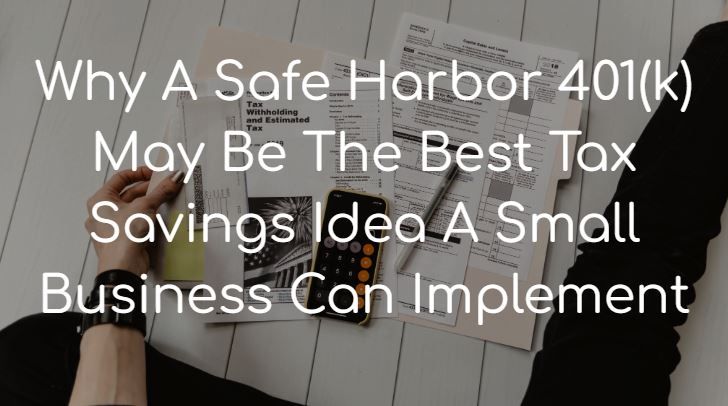Why A Safe Harbor 401(k) May Be The Best Tax Savings Idea A Small Business Can Implement

Let’s face it - none of us like paying more than we need to in taxes. If you’re self-employed and you’ve started having some financial success, you’ve most likely been hit with a tax bill that made your toes curl (and not in a good way). For those of us unaware of how basic taxes work, let’s look at typical taxes a small business pays:
- Federal Taxes - Ranges from 10% up to 37% with most Americans falling between the 22%-32%.
- State Taxes - According to US News the average American paid 8.9% of their income to state taxes
- Social Security Tax - As much as 12.4% of your income may go towards Social Security benefits
- Medicare Tax - As much as 2.9 % of your income may go towards Medicare benefits
When we add this up, even if we stick to the low end of the scale, we end up with between 30-40% of our income GONE to cover taxes…and this doesn’t include things such as Unemployment Insurance or Workers Compensation! Is it any wonder small business professionals are constantly looking for as many tax deductions as possible?
While there are many tax saving avenues that exist, one of the best options is to utilize a 401(k) plan. These plans allow small business owners to contribute up to $69,000 in 2024 with an additional $7,500 available if they’re over the age of 50. While these limits are not as high as setting up a cash balance plan, for many small business owners, this can be a huge savings opportunity - both for retirement and for taxes.
Yet there are often misconceptions about how 401(k) plans should be designed. Today we’re going to cover the highlights regarding plan design options in the attempt of bringing clarity to an often convoluted conversation.
401(k) Contributions:
Let’s start with how one even gets to the point where they can get to the $69,000 401(k) contribution limits. This number is the combination of a couple of different things:
- Personal contribution limits - As an individual, a person can contribute up to 100% of their earned income to a maximum of $23,000 into their 401(k).
- Company Match - A company can match up to 6% of an employee’s salary
- Non-Elective, Non-Safe Harbor Contributions (also known as a “profit share”) - a company has the option of doing a discretionary “profit share” each year. This can be a set percentage to each employee (i.e. 5% of everyone’s salary) or can follow what’s known as “New Comparability” rules which allow employees to have their share of the profit based on their age and income. This option can make up whatever’s left after personal contributions and company match to get to the maximum allowed contribution.
Let’s look at an example:
Assume a business owner earns $300,000 per year, files his taxes as married filing jointly, is 45 years old, and has no employees. This situation would yield the following numbers
| Income | Employee Contributions | Company Profitshare | Total Contribution | Income Tax Savings | Payroll Tax Savings |
|---|---|---|---|---|---|
| $300,000 | $23,000 | $46,000 | $69,000 | $16,560 | $10,557 |
In addition to the savings on his federal income taxes, this also lowers out his total payroll taxes (i.e. Social Security and Medicare Taxes). Assuming he had not incorporated and was paid as 1099 Independent Contractor he would save the 15.3% in payroll taxes that would otherwise need to be paid. As seen, putting away a total of $69k for his retirement saves her over $27k in federal taxes! Assuming he also had state taxes of 5.9% as we do here in Montana, this would yield a total of over $31k in tax savings!
Conclusion:
As seen, a small business owner could potentially benefit in a huge way from the tax savings a 401(k) can offer. If you're ready to learn more, let's connect. Feel free to schedule a 15 minute phone call with me using this link where we can answer any questions you have and see if this vehicle could help you.
In addition, you can also email me with any questions at Robert@LinkFinancialAdvisory.com

Member discussion